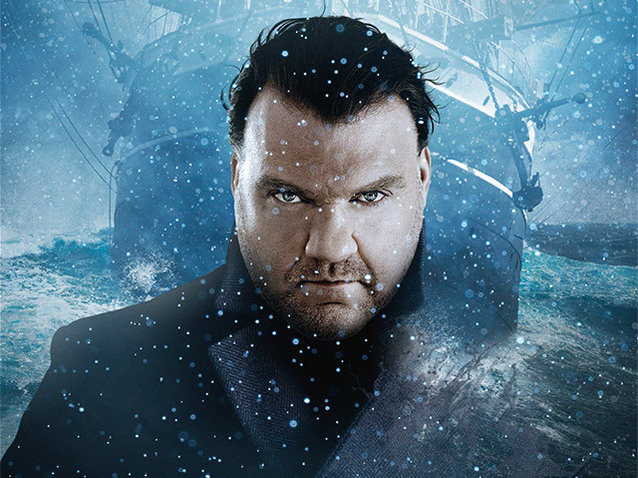

These are characters who listen to, and react to and with each other. This is a true musical and dramatic ensemble performance, where the characters seem to be truly interacting with each other and engaged in a real drama, rather than a high level vocal concert. What strikes me about this performance, more than any one specific element, is its dramatic force and unity. Janssen avoids either extreme, giving us the complexity and depth of the character. The risks for a singer portraying this character are to so wallow in that gloom that the result is a monochromatic bore, or alternately to concentrate on the music so that what we get is a vocal concert rather than Wagner's music drama.

The Dutchman is one of Wagner's darkest characters, in a state of perpetual despondency. But his voice makes clear the desperation and anguish of the character, and the specificity of his way of inflecting individual words and whole phrases making his portrayal treasurable. One normally thinks of Schorr and George London as perhaps the greatest of Dutchmen on disc, and indeed Janssen lacks the particularly lovely and darkly focused sound of those two. Janssen too is a uniquely specific Dutchman. It is this duet, rather than the Ballade, that is the locus of Flagstad's performance. What is particularly special here is having Flagstad's Senta, captured here in the prime of her career, the interaction between Flagstad and Janssen - not a baritone and soprano singing to us, but two characters relating with specificity to each other. Flagstad sings with a tenderness and a glowing radiance that no other Senta has duplicated. The highlight is 'Wie aus der Ferne', the second act duet between Senta and the Dutchman. She makes real the naive, sacrificing, and hopelessly romantic maiden that Wagner imagined in creating his Senta, with singing that is extraordinarily beautiful. Indeed her performance may surprise those listeners who have typed her as a matronly personality. Having Flagstad's Senta, captured here in the prime of her career, is the obvious selling point for this set. This release opens up the sound of this performance in a way that has never been the case before. Prior issues have issued parts or all of the material, usually incorrectly pitched and with more distortion and compression than we have here. Once past that exciting and taut performance, we are thrust into a performance of incredible momentum and drama, and with stunningly good sound for a 1937 live recording. Since this was to focus on Flagstad, EMI apparently did not record the Overture, so Caniell provides a Reiner / Metropolitan performance from 1950 to get the performance started.

EMI did not do a very good job of keeping and documenting what they had, which has created problems for those who would try to restore and make available these treasures. The latter have remained missing and are presumably lost. They made test recordings of the performances of THE FLYING DUTCHMAN on 7 and 11 June, 1937, and a few other tests on 16 June (with a different Erik). ĮMI intended to record as much of Kirsten Flagstad as they could in the 1937 'Coronation Season' at Covent Garden. Caniell explains in detail where these occur in his notes accompanying the set. A few other chunks that were missing and were not as self-contained as that duet have been filled in with excerpts from other performances, connected with keeping Daland (Weber) and Reiner consistently throughout. Wisely, Immortal Performances puts the disc break after the Ballade, which is preferable to creating a gap of a few seconds in the music. Even in this production it has been labeled 'slightly abridged' because of the apparent loss of the original recording of the Erik-Senta scene from the second act (the scene that follows Senta's Ballade), which has simply been omitted here. That is certainly true of this DUTCHMAN, which has had a checkered history. The truth is that Immortal Performances has consistently been reissuing performances that have been issued before in some form, often repeatedly, and inevitably the quality of this label's restoration is miles beyond that which has gone before. I do not use the word 'remarkable' lightly.

"Score another triumph for Richard Caniell and his remarkable Immortal Performances label. Restoration, re-creation & transfers by Richard Caniell. Booklet with photos & notes by Richard Caniell. (Canada) 2-Immortal Performances IPCD 1051. Kirsten Flagstad, w.Merola Cond.San Francisco Opera Orch.: Senta's Ballad, Live Performance, 1949 Befreit, Allerseelen, Cäcilie (all Strauss), Live Performance, 1950. DER FLIEGENDE HOLLANDER, Live Performance, 6 -11 June, 1937, w.Fritz Reiner Cond.Royal Opera House Ensemble (slightly abridged) Kirsten Flagstad, Herbert Janssen, Ludwig Weber, Max Lorenz, etc.


 0 kommentar(er)
0 kommentar(er)
